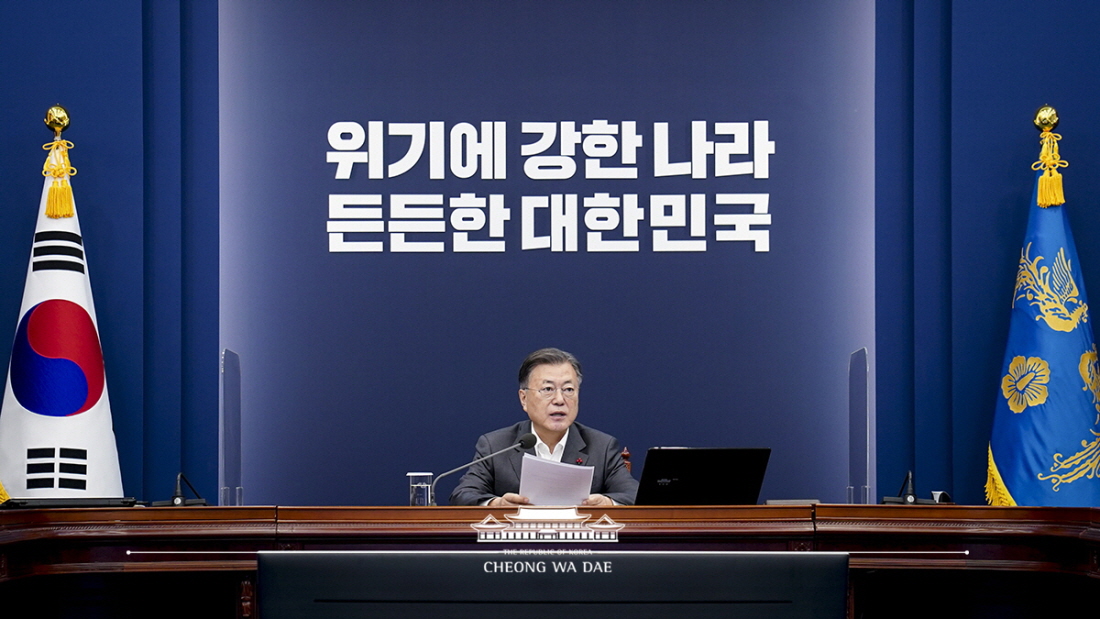이 웹사이트는 제19대 대통령 임기 종료에 따라 대통령기록관이 「대통령기록물 관리에 관한 법률」에 의해 이관받아 서비스하는 대통령기록물입니다. 자료의 열람만 가능하며 수정 · 추가 · 삭제는 불가능합니다.
다만, 「개인정보보호법」에 의하여 개인의 정보를 보호받기 원하시는 분은 관련 내용(요청자, 요청내용, 연락처, 글위치)을 대통령 웹기록물 담당자(044-211-2253)에게 요청해 주시면 신속히 검토하여 조치해 드리겠습니다. 감사합니다.
SPEECHES & REMARKS
BRIEFINGS
Opening Remarks by President Moon Jae-in at Meeting with His Senior Secretaries

Thanks to proactive cooperation from the people and the medical community, the spread of COVID-19 continues to abate, and various epidemic prevention and control-related indices are improving markedly. Our people have actively cooperated with the Government’s anti-epidemic measures, and the medical community has done everything possible to secure hospital beds. I am grateful to everyone. If this trend continues, we can be sure that the spread of the virus will keep subsiding and reach previous levels.
However, we are in for two critical junctures. The first is the concern that COVID-19 could spread further during the Lunar New Year holiday, and the second is the possibility of a full-blown Omicron outbreak. There is also the chance that these two situations could occur simultaneously. With the Omicron variant currently spreading across the world, the United States and Europe are facing their worst circumstances so far – daily case counts in both have broken a million. Japan is also showing signs of exploding case numbers. On the domestic front, however, we have been able to stave off the spread of the Omicron variant successfully through the power of our people.
In addition – even though our disease control authorities are doing their utmost to manage the situation – in the end, it is only a matter of time before the Omicron variant becomes the dominant strain in Korea as well. Once it becomes dominant, a temporary spike in the number of confirmed cases seems unavoidable – a situation that we have to be very vigilant and raise our guard against. For us, it may be the last critical juncture. However, given the developments to date at home and abroad, I am convinced that if we do our best to respond to the spread of this variant, we can overcome it, too, as we have done so far.
The Government will have to swiftly reconfigure our anti-epidemic and medical system to respond to the Omicron variant and make preemptive preparations for a variety of possibilities. We need to analyze clinical data on Omicron at home and abroad as much as possible to customize response strategies, and efforts to thoroughly inform the public and seek their cooperation accordingly should also be strengthened. In particular, it has been confirmed that this variant is highly infectious, but only a small percentage of those infected become severely or critically ill. Therefore, the focus of our response should shift from preventing infections to keeping symptoms from becoming severe, and speed and efficiency should be increased on various fronts, including diagnostic tests, epidemiological investigations and treatments.
When it comes to medical responses, we have to quickly set up a system that enables us to take care of patients rapidly and effectively as a preparation for a surge in the number of infected being treated at home as they are asymptomatic or have only mild symptoms. In particular, it is very important to increase the participation and role of neighborhood clinics, so I urge you to accelerate the establishment of the system while enhancing cooperation with the medical community.
It has been proven time and again that vaccination is the most important factor in reducing the spread of the Omicron variant and the percentage of severely or critically ill patients and fatalities. Administering booster shots to more of the elderly is also playing a decisive role in keeping the current spread under control and decreasing the number of patients who are severely or critically ill. Therefore, the speed at which booster shots are given to those 50 and under is now the key to determining how serious Omicron-induced damage will be. Every effort must be made to ensure that they receive their booster shots before Omicron becomes the dominant strain. I also urge a quick decision with regard to expanding inoculation eligibility for children and adolescents and phasing in the administration of a fourth dose.
In addition to the domestically developed antibody treatment, the Government plans to begin using oral medication this week. If so, Korea will be introducing such treatment significantly faster than other countries. This is very fortunate, and I hope that actively administering the medicine to those recuperating at home or in residential treatment centers, beginning with the elderly, will contribute greatly to reducing the number of severely or critically ill patients.
However, the situation differs country by country, and we will begin using this treatment relatively earlier than others. Given this fact, we must do everything possible to put these pills to the most effective use, including the selection of those eligible and the establishment of a system to rapidly prescribe and dispense the medication in the early stages after the onset of symptoms. All-out efforts have to be made to make the best use of the oral treatment in the manner best suited to the situation.



